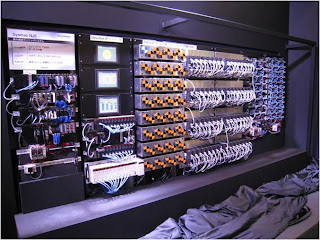Ethernet ISO/OSI reference model:
The “Open Systems Interconnection” (OSI) layer model is a reference model for data transmission in networks named after a working group of the International Standardization Organization ISO.
The model consists of seven layers:
Two hardware-oriented layers (layers 1 and 2), two transmission-oriented layers (layers 3 and 4) and three application-oriented layers (layers 5, 6, and 7).
As a reference model, OSI is not a recognized standard. Many products in telecommunications and in networking use the ISO/OSI model as a foundation.
The 7 layers are as follows:
Physical layer (layer 1):
The physical layer defines the bit transmission of data via the network at the cable and connector level.
Data-link layer (layer 2):
The data-link layer groups data into frames and adds information required for passing on the frames. Layer 2 is responsible for transporting data frames from node to node and for error correction.
Network layer (layer 3):
The network layer controls the routing of the frames in conjunction with layer 2. It handles the addressing of the frames and how they are routed in the network. An example of this layer is the Internet protocol.
Transport layer (layer 4):
Coordinates the transmission of data packets.
It checks whether all packets have been received completely. A typical example of layer 4
is the Transmission Control Protocol (TCP).
Session layer (layer 5): The session layer establishes a connection between the processes running on different hosts. It is responsible for opening a “Session” and for a continuous dialog of requests and responses between the individual applications.
Presentation layer (layer 6):
The presentation layer is responsible for converting data into the format required for the specific application.
This layer also compresses texts and converts various codes used by the partners.
Application layer (layer 7):
The application layer is responsible for applications directly available to the user, such as file transfer or mail programs.
The user recognizes data transmission in the form of requests or responses.
















